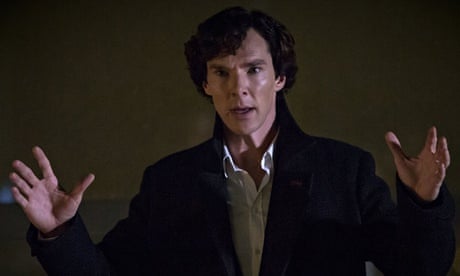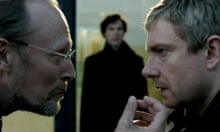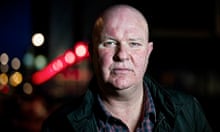This series of Sherlock was supposed to be one for the fans, full of in-jokes and character trait reversions that only a mother, or a fan-fic obsessed devotee, could love. Clearly, this has backfired. The fans were not best pleased. At the end of my last blog there were a few hundred comments saying the show had lost its way – it was too knowing, too comedic and had strayed too far from the formula. These came with a piece in the Independent saying you shouldn't have to concentrate too hard to enjoy Sherlock (as if the past two decades of outstanding television, from The Wire to EastEnders, haven't repaid viewers for taking more than a passing interest), as well as a more reasoned suggestion by Mark Lawson that shows such as Sherlock and Doctor Who should always be seeking to reach new fans and not just pleasing their online hardcore.
But this episode should win the underwhelmed around. A newspaper proprietor villain, hundreds of twists and a total dismantling of all that lovey-dovey stuff from last week. This was the episode the fans actually wanted.
"I've just told you the western world is run from this house and you want to talk about dinner?"
There's a great scene early on where the episode struggles to switch gears from romcom to crime conspiracy and John and Sherlock are left stalling. Sherlock's trying to tell John about Charles Augustus Magnussen, the evil newspaper proprietor who has a vault of secrets about every major figure in the western world, but John can't get over the fact that Sherlock has been shamelessly canoodling with Janine – most unbelievably, the couple had been a sharing a bath.
"I'll tell her that our entire relationship was a ruse to break into her boss's office. She'll probably dump me after that, but you're the expert on women"
Pretty quickly we learn that Sherlock hasn't suddenly developed the capacity to love. He's been faking a relationship, even an engagement, to get close to Janine because she's Magnussen's PA. This is a particularly callous move – and while it's played here for laughs, you can't help but think of the similarly heartless undercover police officers who've pulled the same trick in real life. Clearly, Sherlock hasn't developed the capacity for compassion.
But that's not the only relationship that isn't what it seems. When Sherlock arrives in the office, Janine is knocked out cold while Magnus is held at gunpoint by a mystery assassin, who Sherlock believes to be an MP he was blackmailing. That's one deduction he got wrong. The assassin is revealed to be Mary. Of course the clues were all there: quick reaction times, impressive memory, a mysterious past. (A doff of the deerstalker to those commenters who spotted them last week.) We don't have long to find out how this all relates to Sherlock though, as she quickly shoots him in the chest.
The mind palace bits are particularly good in this episode, and in the three seconds before Sherlock falls unconscious there are guest appearances from Sherlock's old dog Red Beard and a chained and straitjacketed Moriarty, who lures Sherlock towards the padded cell of death. "You'll love death, Sherlock," he teases. "No one ever bothers you."
"Shag-a-lot Holmes"
Not a good headline to wake up to. Or even a good headline. Turns out that while Sherlock's been unconscious Janine's been selling madeup kiss-and-tells to the tabloids to get back at him while turning a profit. She doesn't seem too bothered about it all though. Apparently, it's all laughs when someone sleeps with you, proposes to you but then turns out they just wanted you as a minor part in a sleuthing vendetta.
Oh, and Sherlock's fine, of course. It turns out Mary never meant to kill him, just to shoot him in the chest in such a way as to bring him an inch from death. Risky game if you ask me. Mary, it turns out, is a former spy and assassin who sought a new identity in London but can't be safe while Magnussen knows her true identity. She was about to kill him when Sherlock arrived with a plan of his own.
"The Alexandrian library of secrets and scandals - and none of it is on a computer"
Cut to Christmas and Mary's super-pregnant and all is forgiven between her and John. Other shows would have wrapped things up here, but Sherlock proceeds to drug Mary and his whole family in an attempt to break into Magnussen's store of info and get him arrested. Only one problem with that plan: the secrets only exist in Magnussen's own private mind palace. When Sherlock and John arrive Magnussen has already second-guessed them and is ready to frame them for selling state secrets.
The value of knowledge was the theme of this episode and while some may have found the Murdoch analogies a little heavy-handed, I think it's important to add a bit of drama into the implications of holding private information. The public were largely disinterested by the phone-hacking scandal; celebrity misconduct and intermingling elites felt like old news. But this demon headmaster-style villain does a little more, albeit cartoonishly, to highlight the issues surrounding privacy and power.
"You're forgetting. I'm a high-functioning sociopath."
So after an hour and a half of secret vaults and mind palaces, false identities and fake relationships, the climax of the episode was a very simple shot of Sherlock killing Magnussen in cold blood. Sherlock is heartless, as we were reminded by his fake relationship with Janine, but here we see him murder without flinching, albeit to protect Mary and therefore John, to put Magnussen's mind palace offline.
So perhaps the show's creators have been one step ahead of the audience in this series. Without the sappy previous episodes, and the inevitable fan response that the show had lost its way, we would never have been convinced that Mary and John were going to settle down, and that Mary had simply wandered into Sherlock's life by chance in a show where nothing happens by coincidence.
The question is, can you turn a BBC crown jewel series, with an episode on New Year's Day, into an exercise in audience manipulation just for a better payoff at the end of the series? Especially when you only get three episodes per year to play with.
I'd say you can and, as I said last week, I think we've tired of the traditional detective format, well trodden by Poirot/Morse/Creek/CSI, where a single case is wrapped up with a few clues within one episode. Sherlock fiddling with that format is part of the reason for its success, and I'm fully on board with it continuing in ever-more brash ways.
"Did you miss me?"
Oh, just one more thing. Guess who's back? On every screen in the country, an animated gif of Moriarty with the words "DID YOU MISS ME?" Not quite a cliffhanger, but a setup for next year's series. Will we see Sherlock and Mary vs Moriarty, with John bringing up the rear?
Notes and observations
It's been alluded to before but clearly Sherlock was once a hard-drug user, and both Mycroft and his parents knew about it. When Mycroft calls Sherlock his brother, he shoves him up against the wall and says: "Don't appall me when I'm high." A great line – expect to hear it hollered at Glastonbury this year.
I just realised that Sherlock's mind palace uses the same font as the London Underground.
Nice inclusion of the fake house on Lenister Gardens. There was actually a famous hoax there in the 1930s. A hustler sold a few hundred tickets for a charity ball. It was only when the guests, in full evening dress, knocked on the fake door that they realised they'd been conned.
Mysteries unsolved
Maybe this is just me being thick, but Sherlock kept claiming his stay in the crack den was to do with Magnussen. I don't see how. Was it just an excuse?
And, of course, the big one: how did Moriarty survive his own suicide? Or did he? Could he be taunting Sherlock from beyond the grave? No doubt there will be more than one explanation.
And that's it. Maybe see you again in 2015. Good grief.








Comments (…)
Sign in or create your Guardian account to join the discussion